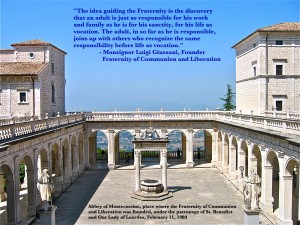Life in the Fraternity of Communion and Liberation forms us to know and appreciate the role of the heart in all things. Looking at the spiritual life, “The heart is the key to all true prayer. When prayer arises out of our deepest center it is pure and totally free. It seeks nothing but to reveal to God how we truly are at that moment, with all our desires and concerns, our hopes and expressions of wonder and praise at God’s goodness. Beneath whatever external “form” we use to come before God is the silent pulse that carries our “Yes” to God in a rhythm of faith.” (NS)
Tag: Communion and Liberation
Way of the Cross over the Brooklyn Bridge
On Communion and Liberation
A video on the Communion and Liberation Movement –one of the lay ecclesial movements in the Catholic Church. There is a group of Communion and Liberation that meets weekly at 7pm, St Mary’s Priory and Church, New Haven, CT.
This Movement was approved by St. John Paul II, and followed closely by Pope Benedict, and now by Pope Francis.
Communion and Liberation Fraternity anniversary
Andrea Aziani sainthood cause opened
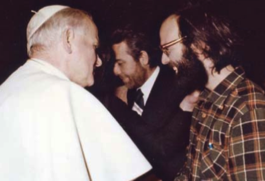 On February 2, during Mass celebrating the 19th anniversary of the Diocese of Carabayllo, in the city of Lima, Peru, Bishop Lino Panizza, announced the opening of the cause of beatification of Andrea Aziani.
On February 2, during Mass celebrating the 19th anniversary of the Diocese of Carabayllo, in the city of Lima, Peru, Bishop Lino Panizza, announced the opening of the cause of beatification of Andrea Aziani. Pope Francis to Communion and Liberation: the Lord alone is at the center
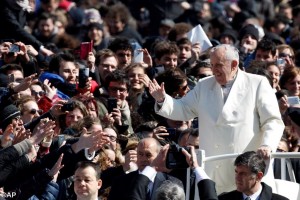 On Saturday, March 7, 2015, His Holiness Pope Francis with the Communion and Liberation to honor the 60thanniversary of the birth of the Movement and the 10th anniversary of the death of, the Servant of God Father Luigi Giussani. Conservatively there were 8oK people in Saint Peter’s Square. Here is Zenit’s translation.
On Saturday, March 7, 2015, His Holiness Pope Francis with the Communion and Liberation to honor the 60thanniversary of the birth of the Movement and the 10th anniversary of the death of, the Servant of God Father Luigi Giussani. Conservatively there were 8oK people in Saint Peter’s Square. Here is Zenit’s translation.
Dear Brothers and Sisters, good morning!
I welcome you all and thank you for your warm affection! I give my cordial greeting to the Cardinals and Bishops. I greet Don Julián Carrón, President ofyour Fraternity and I thank him for the words he addressed to me on your behalf.I also thank don Julian for the beautiful letter he wrote to all, inviting you to come. Thank you so much!
My first thought goes to your Founder, Monsignor Luigi Giussani, remembering the 10thanniversary of his birth into Heaven. I am grateful to Don Giussani for several reasons. The first, more personal, is the good this man did to me and to my priestly life, through the reading of his books and his articles. The other reason is that his thought is profoundly human and reaches man’s profoundest longing. You know how important the experience of encounter was for Don Giussani: encounter not with an idea but with a Person, with Jesus Christ. Thus he educated to freedom, guiding the encounter with Christ, because Christ gives us true freedom. Speaking of encounter there comes to my mind Caravaggio’s “The Calling of Matthew,” before which I paused at length in the church of Saint Louis of the French, every time I came to Rome. None of those who were there, including Matthew avid for money, could believe the message of that finger that pointed at him, the message of those eyes that looked at him with mercy and chose him for his following. He felt that wonder of the encounter. Thus is the encounter with Christ, who comes and invites us.
Everything in your life, today as in the time of Jesus, begins with an encounter. An encounter with this Man, the carpenter of Nazareth, a man like all others, but, at the same time, different. We think of John’s Gospel, where he recounts the disciples first encounter with Jesus (Cf. 35-42). Andrew, John, Simon: felt that they had been looked at in their depth, known intimately, and this generated surprise in them, a wonder that made them feel immediately bound to Him … Or when, after the Resurrection, Jesus asks Peter: “Do you love Me?” (John 21:15), and Peter answers: “Yes”; that yes was not the result of will power, it did not come solely from the decision of the man Simon: it came first from Grace, it was that “primerear,” the preceding of Grace. This was the decisive discovery for Saint Paul, for Saint Augustine, and so many other Saints: Jesus Christ is always first He “primereas” us; He awaits us. Jesus Christ precedes us always, and when we arrive, He is already there awaiting us. He is like the flower of the almond tree: it is the one that flowers first and announces spring.
And this dynamic, which arouses wonder and adherence, cannot be understood without mercy. Only one who has been caressed by the tenderness of mercy really knows the Lord. The privileged place of encounter is the caress of mercy of Jesus Christ on my sin. And it is because of this that you have heard me say sometimes that the post, the privileged place of the encounter with Jesus Christ is my sin. It is thanks to this embrace of mercy that one feels like answering and changing, and from which a different life can flow. Christian morality is not the titanic, willful effort of one who decides to be coherent and who succeeds, a sort of solitary challenge in face of the world. No, this isn’t Christian morality; it’s something else. Christian morality is an answer, it is a moved answer in face of astonishing mercy, unforeseeable, in fact, “unjust” according to human criteria, of One who knows me, knows my betrayals and loves me anyway, esteems me, embraces me, calls me again, hopes in me, expects from me. Christian morality is not ever to fall, but to get up always, thanks to his hand, which takes us. And the way of the Church is also this: to let God’s great mercy manifest itself. In past days I said to the new Cardinals: “The way of the Church is that of not condemning any one eternally; to spread God’s mercy to all persons who ask for it with a sincere heart: the way of the Church is, in fact, that of going out of her enclosure to go and seek those far away on the “peripheries” of existence; that of adopting integrally the logic of God,” which is that of mercy (Homily, February 15, 2015). The Church must also feel the joyful impulse of becoming a flower of the almond tree, that is spring, as Jesus was or the whole of humanity.
Today you also remember the 60 years of the beginning of your Movement, “born in the Church – as Benedict XVI said – not from an organizational will of the Hierarchy, but originating from a renewed encounter with Jesus and thus, we can say, from an impulse stemming ultimately from the Holy Spirit” (Address to the Communion and Liberation pilgrimage, March 24, 2007: Insegnamenti III, 1 [2007], 557).
After sixty years, the original charism has not lost its freshness and vitality. However, remember that the center is not the charism; the center is only one, it is Jesus, Jesus Christ! When I put my spiritual method at the center, my spiritual journey, my way of acting it, I leave the way. The whole spirituality, all the charisms in the Church must be “decentralized”: the Lord alone is at the center! Therefore, when in the First Letter to the Corinthians Paul speaks of charisms, of this very beautiful reality of the Church, of the Mystical Body, he ends by talking about love, that is, about what comes form God, what is proper to God, and which enables us to imitate Him. Never forget this, be decentralized.
And then the charism is not kept in a bottle of distilled water! Fidelity to the charism does not mean to “petrify it” – it is the devil who “petrifies,” don’t forget this! Fidelity to the charism does not mean to write it on a parchment and put it in a frame. The reference to the legacy that Don Giussani left cannot be reduced to a museum of memories, of decisions taken, of norms of conduct. It certainly entails fidelity to the tradition, but fidelity to the tradition – Mahler said – “means to keep alive the fire and not adore the ashes.” Don Giussani would never forgive your losing the freedom and being transformed into museum guides and adorers of ashes. Keep the fire alive of the memory of that first encounter and be free!
Thus, centered on Christ and on the Gospel, you can be arms, hands, feet, mind and heart of an “outgoing” Church. The way of the Church is to go forth to seek those that are far in the peripheries, to serve Jesus in every marginalized, abandoned person, without faith, disappointed by the Church, prisoner of his own egoism.
“To go forth” also means to reject self-reference in all its forms; it means to be able to listen to one who is not like us, learning from everyone, with sincere humility. When we are slaves to self-reference, we end up by cultivating a “brand spirituality”: “I am CL.” This is the brand. And then we fall into the thousand snares that self-referent satisfaction offers us, that looking at ourselves in the mirror, which leads to disorienting us and transforming us into mere managers of an NGO.
Dear friends, I would like to end with two very significant quotes of Don Giussani, one of the beginning and one of the end of his life.
The first: “Christianity is never realized in history as fixity of positions to defend, which refer to the new as pure antithesis; Christianity is principle of redemption, which assumes the new, saving it” (Bears Hope. First Writings, Genoa,1967, 119).This was around 1967.
The second of 2004: “Not only did I not ever intend ‘to found’ anything, but I hold that the genius of the Movement that I have seen born is of having felt the urgency to proclaim the need to return to the elementary aspects of Christianity, that is to say, the passion of the Christian event as such in its original elements, and that’s all” (Letter to John Paul II, January 26, 2004, on the occasion of the 50thanniversary of Communion and Liberation).
May the Lord bless you and Our Lady protect you. And, please, don’t forget to pray for me!
Thank you.
Communion and Liberation: for what and why
Here is a presentation on Communion and Liberation (for what & why) from 2004 by Msgr. Lorenzo Albacete (+2014):
https://www.youtube.com/watch?v=ixxykgAZmxo&app=desktop
Cardinal O’Malley’s homily for Msgr Albacete: where Christ the stranger becomes Christ the friend
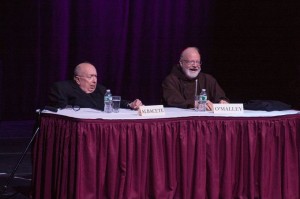 Cardinal O’Malley (of Boston) was a longtime friend of Monsignor Lorenzo Albacete. It was O’Malley who offered the Mass of Christian Burial and delivered the following homily. I laughed and cried. It is a beautiful text for learning the faith, and sharing friendship. Be prepared.
Cardinal O’Malley (of Boston) was a longtime friend of Monsignor Lorenzo Albacete. It was O’Malley who offered the Mass of Christian Burial and delivered the following homily. I laughed and cried. It is a beautiful text for learning the faith, and sharing friendship. Be prepared.
Allow me first of all to tender my heartfelt condolences to Manuel, to Mary and Olivetta, to the many friends and the C.L. (Communion and Liberation) communities.
I spoke with Cardinal Wuerl yesterday, he wanted to be here and sends regards and assurances of prayer and condolences. The Cardinal has asked Fr. Lee Fangmeyer and Fr. Frank Early to represent him and the archdiocese of Washington. Father Lorenzo was very proud to be a member of the clergy of Washington.
I also wish to express gratitude to the Parish of St. Mary’s where for many years father Lorenzo celebrated the Spanish mass. Thank you, Fr. Andrew, for your gracious hospitality.
We are also pleased that Archbishop Roberto Gonzalez, such a close friend of father Lorenzo’s, Bishop Cisneros, Fr. Jose Medina, and Fr. Chris Marino are all with us this morning. We are especially pleased that the supreme Knight Carl Anderson and his dear wife Dorian are here as well.
“Harto dificil resulta para mi…”
These were the opening words of my homily at Lorenzo’s first Mass. they became sort of a code that I would throw into a talk if Lorenzo were present. That would always get a rise out of him.
But today these words ring true: Harto dificil resulta para mi.
This is very hard for all of us who love this man.
Graham Greene, Evelyn Waugh and Garcia Marquez together did not have enough imagination and genius to invent Father Lorenzo Albacete Cintrón. Only God could create a Lorenzo and then He broke the mold because the world did not deserve to have two Lorenzo’s.
In the English world, the day after Christmas is boxing day, a day when employees and tradesmen would receive gifts. If Puerto Rico had a boxing day it would be the day after the feast of the Epiphany or” Reyes” as the Boricuas say; it would be January 7. That is the day Lorenzo arrived in this world. He has truly been a gift, a gift of the Magi to borrow the title from O’Henry’s story, but Lorenzo is the gift of the Magi, the Reyes.
He has certainly been a gift in my life for almost 5 decades. I had met Lorenzo at that time in his life when he took his famous vacation to Bogota, Colombia. A vacation Manolo arranged for Lolo (for Lorenzo). Later Lorenzo told us how he disguised himself as a priest to get near Pope Paul. When he confessed to the Pope he was not really a priest, Blessed Pope Paul said: “Why don’t you become a priest?
It was also around that time when Lorenzo first met Cardinal O’Boyle the Archbishop of Washington. Lorenzo and I spent a lot of time at St. Matthews Cathedral where I was working with Rosario Corredera and the Hispanic community. Lorenzo used to drive me very often. One day, as he was wont to do, Lorenzo parked in the Cardinal’s parking space… (Any ‘no parking’ sign was an invitation to Lorenzo.) At that moment Cardinal O’Boyle was approaching and confronted Lorenzo: “who are you,” he asked. Lorenzo replied: “I am the Cardinal”. Cardinal O’Boyle, who was something of a curmudgeon, answered back: “I am the Cardinal!” To which Lorenzo said: “yes, you are the day Cardinal; I am the night Cardinal.”
It is no wonder that after his first Mass, Lorenzo’s mother asked me to bless her new apartment. I said, “But, doña Conchita, your son was just ordained.” She said, “Yes, padre, but I think he is joking.”
Sometimes Lorenzo ruffled the feathers of the hierarchy.
Cardinal Hickey installed a special phone with an answering machine for priests so that a priest could call it any time if he had a problem. Lorenzo used to call and say things like: “your Eminence, I’ve lost my car keys, could you help me find them.” After the Cardinal was convinced that Lorenzo was not a mental case, he made him his theological advisor.
When Lorenzo was working in Boston, he brought a car phone. Only the president of the Unites States, the chief of police and the head of the mafia had a car phones in those days. When Lorenzo had a car phone installed, I chided him for his extravagance and warned him that the auxiliary Bishop was very critical of Lorenzo’s spending habits. So Lorenzo said: “really? Let’s call him up.” So Lorenzo called the Bishop from his phone in the car and said: “I’m out for a ride with Bishop Sean and I’m calling you on my new car phone. Whoops. I have to hang up, my other car phone is ringing now.” Likewise in Boston when Lorenzo was asked to preach one of the Seven Last Words for the Good Friday services at the Cathedral of the Holy Cross, Lorenzo said: “which of the seven last words Am I supposed to speak on?” When he was told that he should preach on: “my God, my God, why have you forsaken me?” Lorenzo replied: “good, I won’t have to prepare.”
And when he was installed as the Rector Magnifico of the Pontifical Catholic University of Puerto Rico, he was standing next to me on the stage. Lorenzo was wearing a baby blue academic gown with royal blue velvet panels in the ample sleeves, a colorful hood on his back, and a velvet bonnet with a golden tassel. He was carrying something that looked like a wand. Lorenzo turned to me and said: “If this gig as president doesn’t work out, I could get a job with Walter Mercado, (who is a very flamboyant Puerto Rican psychic and astrologer with a Liberaci-sque wardrobe.)
Lorenzo’s friendship with John Paul II dates to when the then Cardinal Wojtyla visited Washington. Cardinal Baum asked Lorenzo to drive the future Pope around. After he returned to Poland Cardinal Wojtyla wrote to Lorenzo with comments and ideas on the research Lorenzo was involved in at the time. A few years later John Paul II returned to Washington. When he met Lorenzo at St. Matthews he said: “Lorenzo, maybe now you will answer my letters.”
Years later Lorenzo was called to Rome to present plans for the John Paul II Institute along with a father from Opus Dei. The priest from Opus Dei was impeccably dressed in his cassock, well groomed for the occasion. He had his copious and well-developed notes in a beautiful leather binder. The priest began by saying: “your Holiness, I did not sleep at all last night knowing that today I would have to make this presentation to the Vicar of Christ on earth.” He then made a very formal and thorough presentation of his well-developed ideas. Afterwards Pope John Paul turned to Lorenzo and asked him to make his presentation. Lorenzo, with a menu of two weeks on his clerical shirt, began by saying: “your Holiness, Your Holiness, I slept very well last night.” Lorenzo then produced an envelope from Riggs Bank, from his suit coat pocket and declared: “I had an overdraft in my checking account, so the bank notified me and sent me this envelope.” He then read his brilliant notes from the back of the envelope and thoroughly entertained St. John Paul II.
We must be careful not to be so dazzled by Lorenzo’s incredible sense of humor. (Fue el hombre más occurente que había conocido en toda mi vida). There was so much more to Lorenzo. What was so out there were: his zany wit, his unkept appearance, his disorganized life, his financial problems, his phobias and his eccentricities. But as Erasmus said of Thomas More: “He was made and born for friendship.” What a capacity for unconditional love! He made everyone feel at home, you knew that you were with a friend. “En el crepusculo de la vida, seremos juzgados solo por el amor,” said San Juan de la Cruz. “At the end of our life we will be judged only by how much we loved.”
Lorenzo’s love for his family, for Conchita, for Manolo, and for friends on every continent, Catholics and atheists, Jews and Protestants was unfailing Lorenzo’s love touched everybody, whether they were from Triumph Magazine to the New Republic. He had what the Spanish call “don de gente.”
That capacity for love, compassion, empathy, made Lorenzo a great friend and a great priest, because the goodness of the Good Shepherd could be glimpsed in his goodness.
Lorenzo’s was not an easy life and his problems were a great source of worry to those of us who were close to him. There were so many false starts. Lorenzo’s meteoric career as President of the Universidad Católica in Ponce. After Lorenzo lost his job as Rector, I sent him two quotes from Fray Luis de León:
“Que descansada vida
la del que huye del mundanal ruido
y sigue la escondida senda
por donde han ido
los pocos sabios que en el mundo han sido.”
After experiencing what envy and intrigue can do to you, Lorenzo was like Fray Luis who wrote:
“Y con pobre mesa y casa
en el campo deleitoso
con solo Dios se compasa
y a solas su vida pasa
ni envidiado ni envidioso.”
Lorenzo’s tenure at Dunwoody was cut short; and his writing for the Sunday Magazine of New York Times came to naught.
But all of the pain and disappointment was dissipated because of Lorenzo’s friendship with Don Giussani. Communion and Liberation was a God send for Lorenzo. And I believe that Lorenzo was a God send for C.L. God’s loving providence engineered this wonderful match. Lorenzo loved young people and was such a gifted teacher and mentor to them. His genius was to be able to dialogue with the culture, science, and with the media. His intellect was so bright and still more illumined by his deep faith.
The love and devotion of the C.L. Community, Olivetta Danese and so many who really cared for Lorenzo and allowed him to accomplish so much, to blossom. All of the wonderful articles inTracce and other publications, the retreats and conferences would never have happened without the help and support of CL. Lorenzo dedicated his book God at the Ritz to Don Giussani from whom Lorenzo learned so much. Lorenzo defines suffering as a thirst for meaning, for understanding, for solidarity, for friendship, for affirmation. Lorenzo said: “The one who suffers wants to be assured that he or she is not crazy, guilty, an outcast for life. I have tried to show how suffering can be a point of departure towards an encounter with Mercy as the origin and destiny of life.”
Today we are consoled that Lorenzo’s suffering was that point of departure, a preface to an encounter with Mercy.
The Emmaus story documents the encounter of two disciples, overcome with grief and fear, and the Risen Christ who seeks them out like the Hound of Heaven. It is the story of a journey and an encounter, two concepts dear to Don Giussani and Lorenzo. It is the story of pain and loss, being transformed into new life and joy. The disciples are running from Calvary, they are seeking safety and they find Christ. Or Christ finds them.
They engage in a conversation. Cor ad cor loquitur. Their hearts are burning within them. Lorenzo engaged in so many of those conversations that allowed people to discover the reality of Christ. Lorenzo’s journey touched the lives of many fellow travelers and allowed them to experience Christ no longer as a stranger, but as a friend.In his own brokenness, Lorenzo could break open the word of God and release its power.
To me, one of the most fascinating lines in this Gospel is where Luke records that Jesus “gave the impression that He was going on farther.” At that moment the disciples might have said: “great talking to you. So long. See you around.” This Gospel would never have been written if they had not invited Jesus to stay with them. Christ wants to be invited. At supper, Jesus shares with them His identity and allows them to recognize Him in His self giving in the breaking of the bread. In St. Matthew’s Cathedral the De Rosen mosaic behind the altar of the Blessed Sacrament depicts the two disciples filled with Eucharistic amazement and the inscription declares: “they recognized Him in the breaking of the bread.” The Lord disappears, but the bread remains, now in the tabernacle, the Body and Blood of Christ.
They set out at once and returned to Jerusalem. They were now willing to risk their lives to share the Good News. They become participants of the mission of their Master to bring glad tidings, to liberate those captive by fear in the Cenacle, to place on those who mourn in Zion a diadem instead of ashes.
I like to think that Cleopas and his buddy were at the Cenacle with Mary and the Apostles for the outpouring of the Spirit on the Church. And I see them in today’s second reading from Acts, part of that community, devoted to the teaching of the Apostles, holding all their material goods in common, caring for the needs of all, and most importantly gathering in their homes for the breaking of the bread. Discipleship really is about liberation and communion. And the joy of knowing that the Lord added to their numbers those who were being saved.
Lorenzo’s journey was an Emmaus journey where Christ the stranger becomes Christ the friend and liberator. Lorenzo was an eloquent messenger of the joy of the Gospel. He found his strength in the Eucharist, he recognized Jesus in the breaking of the Bread.
Let me conclude with the prayer of an old priest, painfully aware of his own limitations and brokenness who reflects that when he lifts the host, he is overwhelmed by his own unworthiness, and he pleads with God that just as the priest held God in his unworthy hands, that God will never let him slip from God’s divine hands.
PLEGARIA DE UN SACERDOTE
(Lope de Vega)
Cuando en mis manos, Rey eterno, os miro
y la cándida víctima levanto,
de mi atrevida indignidad me espanto
y la piedad de vuestro pecho admiro.
Tal vez el alma con temor retiro,
tal vez la doy al amoroso llanto,
que, arrepentido de ofenderos tanto,
con ansias temo y con dolor suspiro.
Volved los ojos a mirarme humanos,
que por las sendas de mi error siniestras
me despeñaron pensamientos vanos;
no sean tantas las desdichas nuestras
que a quien os tuvo en sus indignas manos
vos le dejeis de las divinas vuestras.
Heavenly Father,
In thy hands we commend our brother, Lorenzo.
Hold on tight.
Seán Patrick Cardinal O’Malley
Archbishop of Boston
Homily Monsignor Albacete Funeral Mass
St. Mary’s Church, Manhattan
October 28, 2014
Julián Carrón writes to US Communion and Liberation on the transitus of Lorenzo Albacete
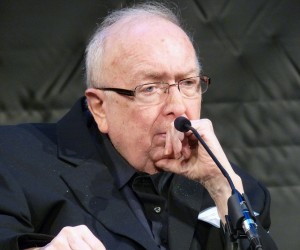 Monsignor Albacete’s life is fulfilled today in front of the merciful Presence of the Mystery who makes all things, and it blossoms in the gladness that we always saw in him.
Monsignor Albacete’s life is fulfilled today in front of the merciful Presence of the Mystery who makes all things, and it blossoms in the gladness that we always saw in him.
The encounter with Father Giussani struck his life so deeply that he asked to serve the Movement in the United States, becoming Father Giussani’s witness on the dramatic front where faith engages with a modernity in search of meaning. He sought this encounter with anyone, challenging the American intelligentsia with the sole weapon of his witness, as a man who had been seized and transformed by Christ in his reason and in his freedom.
Therefore, Pope Francis’ words from Evangelii Gaudium are befitting our dearest Lorenzo: “Christians have the duty to proclaim the Gospel without excluding anyone, not as one who imposes a new obligation, but rather as one who shares a joy, points out a beautiful horizon, offers a desirable banquet. The Church does not grow by proselytism but ‘by attraction.’” He was undoubtedly so captivating that he immediately became friends with anyone he met, because he was showing the beauty and usefulness of faith for facing life’s needs.
With his tireless work, he witnessed to us how faith can become “intelligence of reality,” with his ability to recognize and embrace anyone without ambiguity, but for love of the truth that is present in every person. With his suffering, he has reminded us that there is no circumstance, not even the most difficult and toilsome, that can prevent the “I” from having a daily dialogue with the Mystery.
Let us ask Father Giussani, who now meets Monsignor again as an everlasting friend, to obtain for him that peace that is the sign of a life that rests in the eternal. Let us also pray to the Virgin Mary, to whom Monsignor Albacete attributed his encounter with Father Giussani, to carry him toward sharing in the smile of the Eternal.
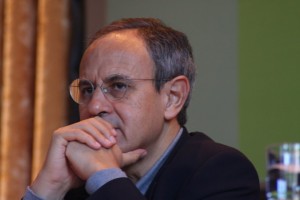 Let us all pray together and personally that we may strive to live like he witnessed, so that we can inherit his legacy of how to follow the Movement within the Church.
Let us all pray together and personally that we may strive to live like he witnessed, so that we can inherit his legacy of how to follow the Movement within the Church.
Julián Carrón
Milan, October 24, 2014
Church bids farewell to Albacete
Marco Bardazzi’s article for the Vatican Insider, “Church buds farewell to Fr. Albacete” gives tribute to great man of God, son of Fr Luigi Giussani.

